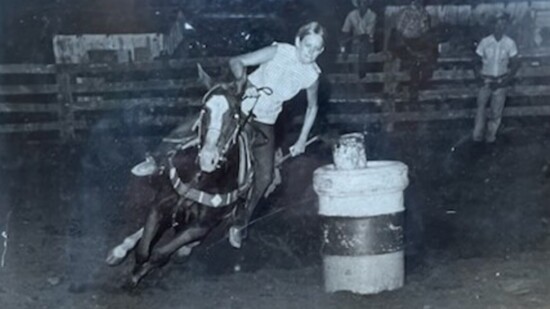When Rodeo Celina stampedes into its inaugural year this year, it brings a new chapter into Collin County.
Celina has long been a “western” town. Established in 1879, it was farmers and ranchers who built the town. The town nearly disappeared in the late 1800s, with a population of just fifty in 1892. But after World War II, the town grew steadily, increasing from 1,051 residents in 1950 to 1,737 in 1990.
Celina is the fastest-growing city in North Texas and even though cement covers the ground where pioneers settled, the western heritage they planted is returning.
Rodeo Celina will have its inaugural rodeo this year, May 31-June 1-2. Until a planned rodeo arena is built in Celina, it will be held at the Southfork Ranch in Parker.
There’s always been a bit of rodeo in Celina.
Fifty years ago, families in the area attended weekly Celina Riding Club “playdays:” rodeo competitions for youth and adults alike. Linda Dove was the mama of one of those families. She and her husband took their two sons, Denny and Rowdy, to the arena, which sat by the railroad tracks, behind the old nursing home, on land owned by Johnny Mays, who was a cow trader. “He was kind enough to let us come and have playdays,” she said.
Playdays aren’t rodeos, but events are similar and involve horses. At the Celina playday, events like pole bending and barrel racing took place. Other events were “for fun” events, like the potato race. In the potato race, a barrel sat at the end of the arena, with a bucket in it, filled with sand and a potato on top. The goal was for the rider to ride to the barrel as fast as possible, grab the potato, round the barrel, and ride straight back to the start line, where another barrel sat, where the rider was to throw the potato in. The fastest time won.
The playdays also included “straight barrel racing:” three barrels, set in a straight line (unlike pro rodeo barrel racing, where barrels are set in a triangle). The goal for the rider was to weave between each barrel, and at the third barrel, come back, weaving through them again, in the fastest time possible.
Playdays in Celina started in the late 1960s. They were held once a month, Dove said, from about March till October. Competitors were divided into classes: the juniors, the intermediates, the seniors, and adults, both men and women. They were a big deal, with entire families participating, the kids and the parents both. They were well attended, Dove said. Playdays “were real popular back then,” she said.” Mothers took turns providing and serving food at the concessions stand, and Dove remembers some of the playdays lasting all day, till sun-up of the next day, because of the large number of competitors. A rodeo secretary kept track of each contestant’s points and awards were given at the end of the year banquet, along with buckles.
Dove won her first buckle at a Celina playday in 1970. She grew up riding, having begun at age three, on a ranch north of Celina, but didn’t learn about the playdays till she turned 19. “I used to ride my horse to the arena,” she said, “on the old Business Highway 289. And I’d make a couple practice runs on him, and then ride back.”
When her sons, Denny Webb and Rowdy Vest, got old enough, they participated in the playdays along with their mom and dad. Denny was five when he began; Rowdy was three. For Rowdy, rodeo turned into more than just a hobby. He competed in high school rodeo, winning the Texas High School Rodeo tie-down roping title in 1989. Playdays were a wonderful way for kids to grow up, she said. “Everybody watched out for each other’s kids,” she remembers. The kids played under the bleachers. “We just turned them loose and never worried about them. It was very family friendly back then.”
Another Celina resident has a tie to rodeo.
Punk Carter and his family moved to Celina in the mid-1960s. A high school rodeo contestant, he wasn’t able to play sports due to having won money at high school rodeos. He wouldn’t have played anyway: he was hooked on rodeo. He remembers being challenged to a footrace by the high school football players. “I ran in my boots and my blue jeans, and they were in their tennis shoes and shorts,” he laughed. “I outran them so bad.”
At the Wolfe City High School rodeo, he won the tie-down roping, the bull riding, and a big trophy for the all-around title, the most desired title in rodeo because a cowboy must compete in more than one event to win it. The trophy sat in the high school trophy case for a while, then Carter lost track of it.
He competed for a bit in pro rodeo, but went into training performance horses and cutting, training cutting horses for celebrities. He’s a National Cutting Horse Association judge, teaches students to barrel race, rope and cut in the U.S. and abroad, and continues to ride and train. He and his brother Roy and dad John are 2018 inductees in the Texas Cowboy Hall of Fame.
The Celina playdays stopped in the late 70s, and Dove barrel raced at small local rodeos in Wolfe City, Mesquite, Cowtown in Ft. Worth, and Blue Ridge. She began competing in American Quarter Horse Association events in the barrels and the pole bending; her horse won a Register of Merit Award (ROM) in arena performance.
Now the next chapter in rodeo begins in Celina, with the inaugural Rodeo Celina May 31-June 1-2. Competition will be sanctioned by the Pro Rodeo Cowboys Association, the world’s largest rodeo governing body. Competitors will be Pro Rodeo Cowboys Association or Women’s Pro Rodeo Association members.
The return of rodeo is a welcome addition to the community, Dove said. “We’re excited to have it.”
